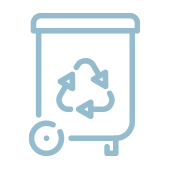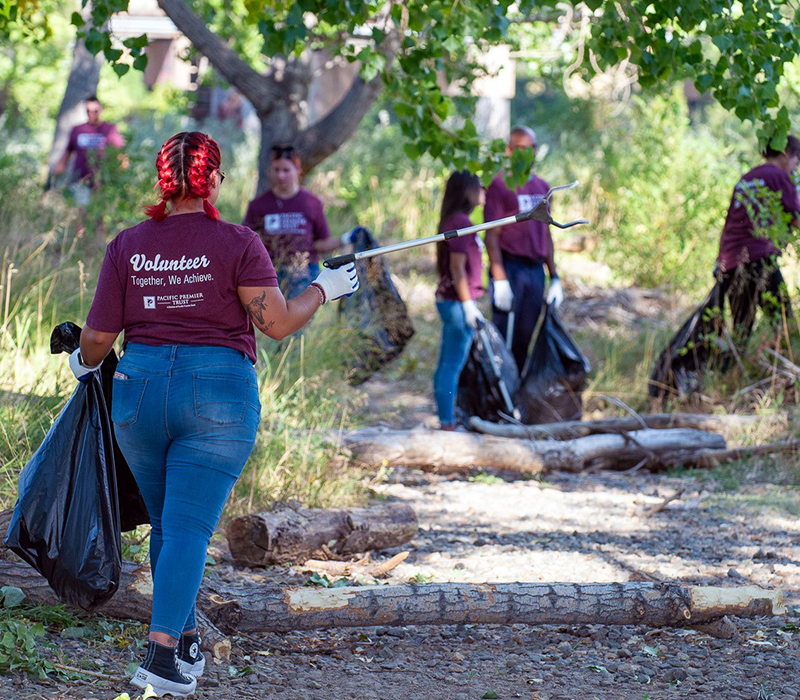It’s everyone’s responsibility to ensure the health and well-being of our future. At Pacific Premier Bank, we are proactively contributing to the collective global transition to a greener economy.
To learn more about our Sustainability Journey, please review the latest Corporate Social Responsibility Report.
{beginAccordion}
Our Sustainability Strategy
{openTab}
Our sustainability strategy is guided by our Environmental Sustainability Policy, which outlines our approach to identifying and reducing our impact across our operations, products, services, and culture.
Our sustainability strategy unfolds at the operational level and in the communities we serve.
{endAccordion}
{beginAccordion}
Climate Risk
We recognize the impact that natural disasters resulting from climate change may have on our clients and communities. Effectively managing these risks requires clearly defined roles and responsibilities. We are establishing an effective structure for this purpose.
For additional information, please refer to our Corporate Social Responsibility Report.
{endAccordion}
{beginAccordion}
Metrics and Targets
GREENHOUSE GAS EMISSIONS
Our approach to greenhouse gas emmisions (GHG) data helps us efficiently manage our energy and resources, while also identifying opportunities to reduce our impact. We continue to conduct an annual assessment of our operational greenhouse gas emissions inventory in line with the principles and methods outlined in the GHG Protocol Corporate Accounting and Reporting Standard. We report both location- and market-based emissions across Pacific Premier's operating control boundary.
OPERATIONAL METRICS – SCOPE 1 & 2
| FY 2023 Emissions mt CO2e | |||||
| Scope | Resource | Unit | FY23 Usage | Location-based1 | Market-based2 |
| Natural Gas | mmbtu | 5,159 | 274 | 32 | |
| 1 | Mobile Gas | gallons | 3,533 | 31 | 1,330 |
| Refrigerants | kg | 146 | 209 | 209 | |
| 2 | Electricity | kWh | 5,899,711 | 1,566 | 1,320 |
| Total Scope 1 | 514 | 514 | |||
| Total Scope 2 | 1,566 | 1,320 | |||
| Total Scope 1+2 | 2,080 | 1,834 | |||
1Scope 2 Location-Based emissions reflect electricity grid subregion average carbon intensity, applied at the facility level (e.g., California average emissions rate).
2Scope 2 Market-Based emissions accounting reflects, wherever possible, the reported carbon intensities of Pacific Premier’s utility providers, applied at the facility level (e.g., Southern California Edison reported emissions rate).
{endAccordion}
{beginAccordion}
Minimizing our Footprint
We take pride in supporting resource preservation through recycling, waste management, and responsible use of energy. Our efforts to reduce our environmental impact are yielding successful results. For example, simply by shredding, recycling, and facilitating paperless transactions, we have accomplished:

Trees
3,905

Cubic Yards of Landfill
646

Pounds of Waste Recycled
442,706

Gallons of Water
1,729,094
{endAccordion}
{beginAccordion}
Creating a Culture of Environmental Awareness
We have identified our daily energy usage as the largest contributor to our footprint. Our actions are focused on procurement of renewable energy, efficiency measures like occupancy sensors, temperature controls, ENERGY STAR-compliant appliances, and LED lighting. Through our corporate Premier Green Impact Program, we are encouraging employees to commit to measurable actions, in and out of the office.
Educate
Employees about sustainability
Increase
Internal awareness of our commitment to sustainability
Create
Simple ways for employees to get involved in sustainability efforts
Reduce
Environmental footprint
{endAccordion}
{beginAccordion}
Environmental Volunteerism

We are committed to environmental stewardship through meaningful volunteer efforts. Partnering with organizations like Heal the Bay, GRID Alternatives, Child Creativity Lab, Human-I-T, Protect Our Rivers, and others, we engage in diverse initiatives such as coastal cleanups, solar panel installations, recycling collection drives, river restoration, and tree planning. These efforts reflect our dedication to preserving and enhancing the natural world for future generations.
{endAccordion}
{beginAccordion}
Investing in Sustainable Communities
We have a long-standing record of investing our time and capital to help strengthen our communities and support organizations and initiatives that serve the disadvantaged. We understand that our ability to mobilize capital puts us in a unique role in the transition to a lower-carbon economy. For that reason, we are committed to supporting the development and implementation of clean energy solutions that benefit the environment as well as our communities.
Our commitment to our communities includes supporting efforts to resolve climate-related impacts that disproportionately affect low-income and demographically diverse populations. This may include, but is not limited to, lending, grants, and investments to promote equal access to clean, healthy, and sustainable home and workplace environments. Across our markets, we continue to finance eco-friendly development that produces green goods or provides green services, such as:
- Solar panel installation projects in San Luis Obispo County
- Support the operations of Santa Barbara County’s largest provider of recycling, waste management, garbage collection, and portable sanitation services
- Purchase of natural gas trucks to replace old diesel trucks for mail-hauling services in a low-income census tract in Los Angeles County
- Credit line to a small business specializing in sustainable design and green building certifications
- Clean water pump solution loan for wastewater distributor serving a moderate-income census tract in San Bernardino County
- Financing for an environmental infrastructure design and construction consulting services firm in Orange County
{endAccordion}

